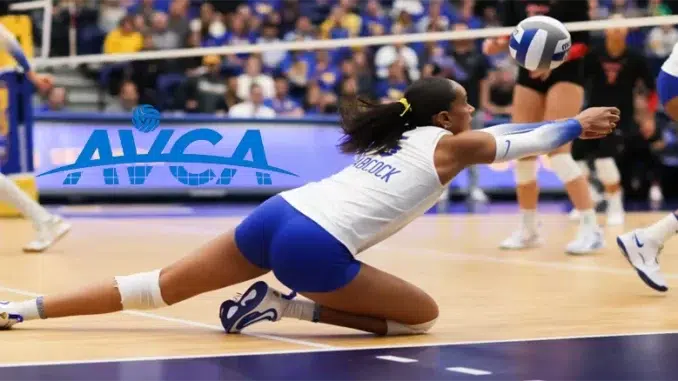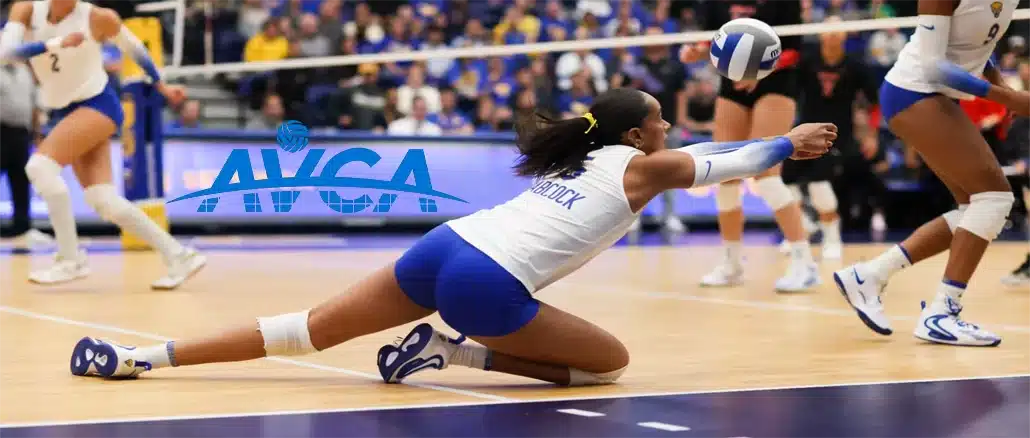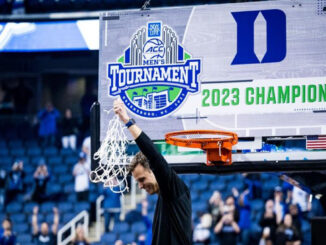
The Atlantic Coast Conference (ACC) has never been stronger in women’s volleyball, and the 2025 AVCA preseason rankings provide compelling evidence of the league’s unprecedented depth and quality. With four teams earning spots in the Top 25 and several others receiving votes, the ACC is positioned to challenge traditional volleyball powerhouses.
Pitt claims the #3 spot in the preseason rankings, bringing back AVCA National Player of the Year Olivia Babcock, while Louisville sits at #4 after reaching the 2024 national championship game. These numbers represent more than just preseason optimism—they reflect programs that have consistently delivered at the highest level.
Pitt’s trajectory under head coach Dan Fisher has been nothing short of remarkable. The Panthers earned their first-ever #1 overall seed in the 2024 NCAA tournament and advanced to the semifinals for the fourth consecutive year. This sustained excellence isn’t accidental; it’s the result of strategic recruiting, player development, and a culture that embraces the pressure of expectations.
Subscribe To ACC Nation Podcast And Get The Latest Football Previews
Louisville’s #4 ranking carries extra weight given their 2024 championship game appearance. The Cardinals defeated #1-seeded Pitt in the semifinals before falling to Penn State in the title match. The return of key contributors suggests this wasn’t a one-time peak but rather the establishment of a new standard.
Pitt and Louisville have invested heavily in facilities, coaching, and recruiting to close that gap.
Historical Context: ACC Evolution
Consider the ACC’s volleyball trajectory over the past decade. Traditionally overshadowed by the Big Ten’s volleyball dominance and the former Pac-12’s depth, the ACC has methodically built programs capable of competing for national championships.
The ACC is notably the only Power Five conference without a national championship in women’s volleyball, but that drought appears increasingly fragile. In the past three seasons, the ACC has sent at least one team—and five teams overall—to the Final Four, demonstrating the conference’s rise.
The addition of Stanford (former PAC 12 power), a team that brings nine national championships worth of experience to the league has fundamentally altered the competitive landscape. Speaking of new additions to the conference, let’s not forget SMU who finished the 2024 season at No. 15 and is ranked No. 10 this year. Also, conference stalwart Georgia Tech begins 2025 in the same place they left off last year at No. 22.
The Contenders: Rising Programs Making Noise
Beyond the Top 25, several ACC programs have also received significant recognition in the preseason voting. North Carolina collected 113 votes, positioning them as the clear leader among “others receiving votes”. This represents a meaningful step forward for a program that has shown steady improvement under the current coaching staff.
College Football | Dying On A Hill. Give Me Week 3
Miami (34 votes) and Florida State (33 votes) a beach volleyball powerhouse, also earned recognition, indicating the conference’s depth extends well beyond the current top tier. These programs have established themselves as consistent NCAA tournament participants and possess the players and ability to break into the Top 25.
Transfer Portal Impact and Roster Construction
College volleyball demands sophisticated roster management, and ACC programs have adapted to those demands. The transfer portal has become a crucial tool for maintaining competitive balance, allowing programs to address specific needs while managing scholarship allocations efficiently.
Louisville’s acquisition of Chloe Chicoine from Purdue exemplifies strategic portal usage. Chicoine’s proven production at the Big Ten level addresses Louisville’s need for additional offensive firepower while bringing championship-level experience to a program that fell just short in 2024.
Similarly, Pitt’s ability to retain key contributors while selectively adding complementary pieces through recruiting and the portal demonstrates the sophistication required to sustain elite-level performance. The Panthers’ four players on the preseason All-ACC team reflect both individual talent and the program’s ability to develop players within their system.
Statistical Deep Dive: Measuring Conference Strength
The numbers supporting ACC volleyball’s rise are compelling. Nine ACC teams earned NCAA tournament bids in 2024, tying the Big Ten and SEC for the most tournament representatives. This depth indicator suggests the conference’s strength extends throughout the membership, not just at the top.
ACC Nation Streaming Radio 24/7
With a look at the RPI (Rating Percentage Index) and strength of schedule metrics, ACC teams consistently rank among the nation’s most challenging schedules. This isn’t coincidental—the conference’s competitive balance forces every team to elevate their play weekly, creating a rising tide effect that benefits all members.
The statistical evidence extends to individual performance metrics as well. ACC players increasingly appear on national watch lists and earn All-America recognition. This talent retention and development pipeline indicates sustainable growth rather than temporary success.
Conference Expansion: The Stanford Factor
Stanford’s entry into its second season as an ACC member brings unprecedented championship pedigree to the conference. The Cardinal’s nine national titles represent more championship experience than the rest of the ACC combined.
Beyond the obvious talent addition, Stanford’s presence elevates every other program. Their recruiting reach, coaching expertise, and championship standards create beneficial pressure throughout the conference. When a program with Stanford’s history joins your league, it forces everyone to examine their own championship commitment and capabilities.
The integration has proceeded smoothly from a competitive standpoint. Stanford received two first-place votes in the preseason coaches’ poll and 264 points, indicating immediate respect from conference peers.
Looking Ahead: Championship Implications
The 2025 season presents the ACC’s best opportunity to capture its first national championship in women’s volleyball. The confluence of established programs hitting their peak (Pitt, Louisville), championship experience entering the league (Stanford), and emerging threats developing depth creates an unprecedented competitive environment.
Nationally, Nebraska leads the overall preseason rankings at #1, followed by Penn State at #2, but the gap between the traditional powers and ACC contenders continues to narrow. More importantly, the conference now possesses multiple legitimate championship contenders rather than relying on a single program to carry the banner.
The scheduling implications alone benefit ACC programs. Regular exposure to championship-level competition within conference play better prepares teams for NCAA tournament pressure while providing more opportunities for quality wins that improve seeding.
The Bottom Line
The 2025 AVCA preseason rankings represent more than statistical recognition—they signal the ACC’s evolution into a volleyball powerhouse. With four teams in the Top 25, several others receiving votes, and championship-caliber programs throughout the membership, the conference has positioned itself to compete at the highest level.
The question is no longer whether an ACC team can win a national championship, but rather which program will be first to break through. Pitt and Louisville possess the talent and experience to compete immediately, while Stanford brings proven championship DNA. Meanwhile, emerging programs like North Carolina, Miami, and others continue building toward their own breakthrough moments.
For volleyball fans who appreciate strategic depth, tactical sophistication, and championship-level competition, the ACC has become must-watch television. The confluence of talent, coaching expertise, and competitive balance creates an environment where any given match can feature future All-Americans and potential championship teams.
The 2025 season promises to be pivotal not just for individual programs, but for the entire trajectory of ACC volleyball. The pieces are in place, the talent is undeniable, and the opportunity is unprecedented. Now comes the most challenging part: translating preseason recognition into championship hardware.






